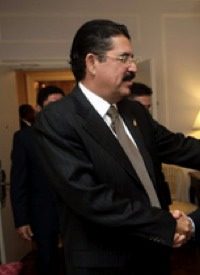
Honduran leader Roberto Micheletti, who was installed as president of the Central American country by the nation’s Congress on June 28, told reporters on July 15 that he would be willing to step down, provided that ousted President Jose Manuel Zelaya relinquishes his claims to the presidency.
Just prior to Micheletti’s installation, a military force, acting on the orders of the Honduran Supreme Court, detained Zelaya and took him to an air force base, where he was taken by plane into exile to San Jose, Costa Rica. The reason cited by the nation’s high court and legislature was that Zelaya was attempting to hold a referendum to explore the possibility of his serving a second term in office, a move prohibited by the Honduran constitution.
AFP news quoted Micheletti’s pledge: "For peace and tranquility in the country … without the return of ex-president Zelaya, I would be ready to do it."
AP reported that Micheletti told reporters in the Honduran capital of Tegucigalpa that he is "willing to leave office if at some point that decision is needed to bring peace and tranquility to the country, but without, I stress, the return of former President Zelaya."
Micheletti announced from the beginning that he would only serve until the end of Zelaya’s term in January. Presidential elections are scheduled for November.
Shortly after assuming his position, Micheletti announced: "We respect everybody and we only ask that they respect us and leave us in peace because the country is headed toward free and transparent general elections in November." He also announced that Zelaya would be welcome to return to Honduras as a private citizen on one condition: "Without the support of Mr. Hugo Chavez, we would be happy to take him back with open arms."
Speaking to CNN en Español, Micheletti’s son, Aldo Micheletti, said that if it became "extremely necessary" for his father to step down in order to maintain peace in the country, he would, as long as Zelaya was not restored to power.
Following the power shift in Honduras, virtually all of the world’s governments and international organizations, such as the United Nations, the Organization of American States and the European Union, condemned the replacement of Zelaya, calling his replacement a "coup." Among the strongest critics of the power transition in Honduras was Venezuela’s Marxist dictator Hugo Chavez.
Shortly after the transition on June 28, the OAS delivered an ultimatum to the Micheletti government for the reinstatement of Zelaya, and when it refused, suspended Honduras from membership in the hemisphere-wide body on July 4. OAS Secretary General Jose Miguel Insulza said on July 15 that the OAS would continue to apply "strong sanctions" on the new government led by Micheletti and support mediation brokered by Costa Rican President Oscar Arias.
Both Arias and Insulza have questionable pasts. When Arias first assumed the presidency of Costa Rica in 1986, one of his first acts was to close down a crucial airstrip near the Nicaraguan border that the semiofficial U.S. support network built for the anti-communist Contras opposing the Sandinista regime of Daniel Ortega. Insulza, as a Chilean socialist, was once political adviser to the Chilean Ministry of Foreign Affairs under the regime of the communist Salvador Allende.
Insulza has offered to help along Arias’ negotiating clout by keeping the thumbscrews firmly applied to Honduras. Reuters news reported that Insulza said it was important to maintain the OAS suspension of Honduras while pursuing dialogue in the talks hosted by Arias — "or at least until he says he needs some other kind of mediation."
On July 13, Zelaya issued a veiled threat by stating that if the Micheletti government did not agree to reinstate him at the next round of negotiations, "the mediation effort will be considered failed and other measures will be taken."
Though Zelaya did not specify what those measures would be, his supporters have frequently threatened violence. "We are going to install the constitutional assembly. We are going to burn the Congress," protest leader Miriam Miranda promised at the latest pro-Zelaya demonstration.
And Zelya himself has not been adverse to advocating violence. AFP quoted his statements made on July 14 in neighboring Guatemala, alongside Guatemalan President Alvaro Colom:
"I want to tell you to not leave the streets, that is the only space that they have not taken from us. The Honduran people have the right to insurrection."
Meanwhle, Marvin Ponce a member of Congress from the leftist Honduran Democratic Unification Party — and a Zelaya supporter — has asked the United States to step up sanctions on the Micheletti government. "We are calling for economic sanctions because it is the only way the coup leaders will give up power," Ponce told Reuters.
The Micheletti government is also under pressure from Zelaya’s leftist supporters among the nation’s labor unions. AP has reported that labor leader Israel Salinas, one of the main figures in the pro-Zelaya movement, told thousands of demonstrators who marched through Tegucigalpa on July 15 that union workers at state-owned companies plan walkouts later this week.
By repeatedly referring to the government of Roberto Micheletti as a "coup," the world’s major media and establishment political leaders have somehow implied that the new president — whose installation was approved by the judicial and legislative branches of government — is an enemy of the rule of law.
And yet these same voices, always clamoring for "democracy," are squarely behind a man who is an advocate of insurrection.


